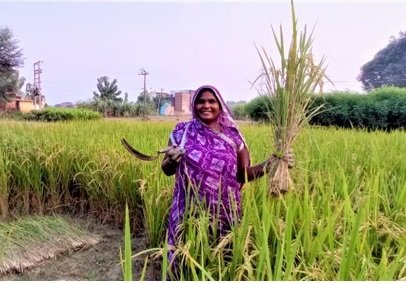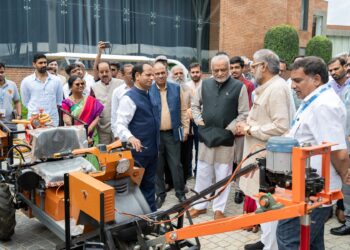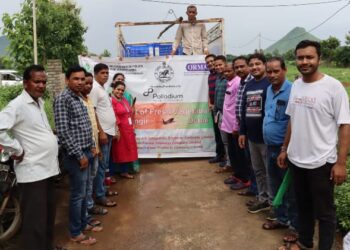For about the last 10,000 years agriculture and farming have been unarguably the most important occupation allowing us to move from being nomadic hunter-gatherers to literally and figuratively putting down roots and establishing civilizations. The agriculture sector employs half of India’s 1.35 billion people and contributes nearly 15 percent of India’s $2.7 trillion economy. Nearly 80 percent of the farmers in India belongs to the Marginal (less than 1 ha) or small farmers (1–2 ha) category. The share of agriculture and allied sectors in gross value added (GVA) of India at current prices stood at 17.8 % in FY20. Farmers & agriculture in India undoubtedly are looked upon with extreme respect and considered of great economic value. Realizing the impact of farmers and agriculture in the development journey of our nation, government has been putting in concerted efforts to improvise their socio-economic stature along with targeting to double farmers’ income. One of the most iconic and controversial move in the same direction was formation of three farm laws, which were
- The Farmers Produce Trade and Commerce (Promotion and Facilitation) Act, 2020, which is aimed at allowing trade in agricultural produce outside the existing APMC (Agricultural Produce Market Committee) mandis;
- The Farmers (Empowerment and Protection) Agreement on Price Assurance and Farm Services Act, 2020, which seeks to provide a framework for contract farming;
- The Essential Commodities (Amendment) Act, 2020, which is aimed at removing commodities such as cereals, pulses, oilseeds, edible oils, onion and potato from the list of essential commodities.
Finance Minister Nirmala Sitharaman had announced these laws as part of the third tranche under Aatmanirbhar Bharat Abhiyaan to support the economy during the fight against Covid-19. On June 3, 2020, the Union Cabinet chaired by Modi approved the three laws, then in the form of ordinances. Two days later, the President promulgated the ordinances. During the Monsoon Session of Parliament, the government introduced Bills to replace the ordinances, which were eventually passed. Although the government framed and pushed these laws with a backdrop of much needed urgent reforms in agriculture, but the farmers feared that the existing APMC mandis, where they sell their produce, mostly wheat and paddy, would be shut down once private players started trading in agri-produce outside the mandi premises, and that once the APMC mandi system became redundant, procurement based on minimum support prices (MSP) too would come to an end.Sporadic protests against the farm laws, including a nationwide road blockade continued for more than a year.
Then in the last month, on November 19, Prime Minister Modi made a surprise announcement about his government’s decision to repeal the three controversial farm laws which have been at the heart of the biggest protest India has witnessed in many decades. The proponents and opponents of these laws may continue to argue about their purported benefits or drawbacks, but one fact is undeniable: the laws have been relegated to the pages of history with the same haste as they were pushed through the parliament.
Understanding the present situation, we have to accept that despite India being largely self-sufficient in food grain production and having welfare schemes, hunger and nutrition remain serious issues, with its ranking as one of the worst countries in the world in food security parameters. For decades, agricultural incomes have witnessed low growth rates, leading to economic hardship for the 40% of the national workforce currently employed in this sector. National yields for many major crops are lower than those in Europe, the US, Brazil or China. Half of the national net sown area is still rainfed, leaving it especially vulnerable to erratic weather and climate change. Farmers across India continue to use more fertiliser than required, leading to air, soil and water pollution (apart from monetary loss). North-west India has become a global hotspot of groundwater depletion because of unsustainable farming practices. More recently, stubble burning in this region has been linked to the deterioration in Delhi-NCR’s air quality during winters.
After this ball and blame game, and afterrepealing Farm Laws, Govt should plan reforms which actually benefit farmers. There is no denying that Indian agriculture needs major reforms, urgently and at multiple fronts: economic, social and environmental. However, a new and broader outlook is required for that.
To make agriculture more profitable, large investments are needed in targeted products and services including education, training, credit access, improved seeds, inputs, irrigation and farming equipment. Equally important are government policies that encourage and strengthen capacity building through farmer cooperatives and value addition services. The latter includes access to packaging, processing, cooling or drying facilities and vocational courses for farming families to increase profits and develop essential skills.
Instead of just selling raw materials, farmers can then receive higher returns from their value-added agricultural sales. Such empowerment needs a bottom-up (instead of a top-down) approach. Stating that corporatization alone is enough to increase farmers’ income is naïveté at best, treachery and corruption at worst.
An oft-ignored but extremely important tool for improving farmers’ livelihoods is quick and efficient information dissemination services. Widespread cell phone ownership and affordable mobile service subscriptions should be leveraged to strengthen data-driven farming through accurate weather advisories, precision input information, in-field pest and disease diagnostics, knowledge translation, price discovery mechanisms and the like.
Indian agriculture is too diverse to regulate centrally from Delhi using a one-size-fits-all approach and nowhere is this more visible than in the environmental ramifications of current agricultural practices. Punjab and Haryana need to be weaned away from unsustainable paddy cultivation that currently uses too much groundwater and electricity. Farmers here were previously encouraged to cultivate paddy through government subsidies and assured procurement. The same economic instruments should now be used to motivate a shift to less water-incentive crops like maize or coarse cereals, while ensuring minimal impact on livelihood of farmers, especially those in the small and medium category.
For example, adivasi farmers in Chhattisgarh recently switched from rice to traditional millet varieties when the government started procuring millets at MSP (minimum support price). Simultaneously, farmers in groundwater-rich states like West Bengal could benefit from increased access to groundwater while ensuring they do not end up over-exploiting this resource. Other incentives such as empowering farmers to sell ecosystem services like carbon sequestration and increased biodiversity can also encourage sustainable practices, but would need the establishment of a proper framework to assess and quantify the environmental benefits of sustainable agriculture.
The three contentious farm laws have forced us to think about the future of agriculture in a largely agrarian country dominated by small and marginal farmers. The prevalent chemical-intensive, monocrop-based, market-purchased-input dependent model has not only failed to benefit majority of the farmers but has also proved to be an ecological, social and financial failure. Genetically modified crops have led to increased use of agrochemicals, failed to sustain the yield gains and increased control of corporations through intellectual property rights.
Promoting unregulated private trade of farm produce is a part of the same paradigm. India’s centuries-old farm practices are based on the principles of sustainability, innovative, hard-working and entrepreneurial farmers. Agro-ecology-based farming and its large network of scientific institutions combined with political will can certainly change the direction of farming in the country. The paradigm shift has to begin with changing the mindset of policy makers from production-centric to sustainability-focused. They have yet to gain confidence in the agroecological model of farming.
(India CSR)






















